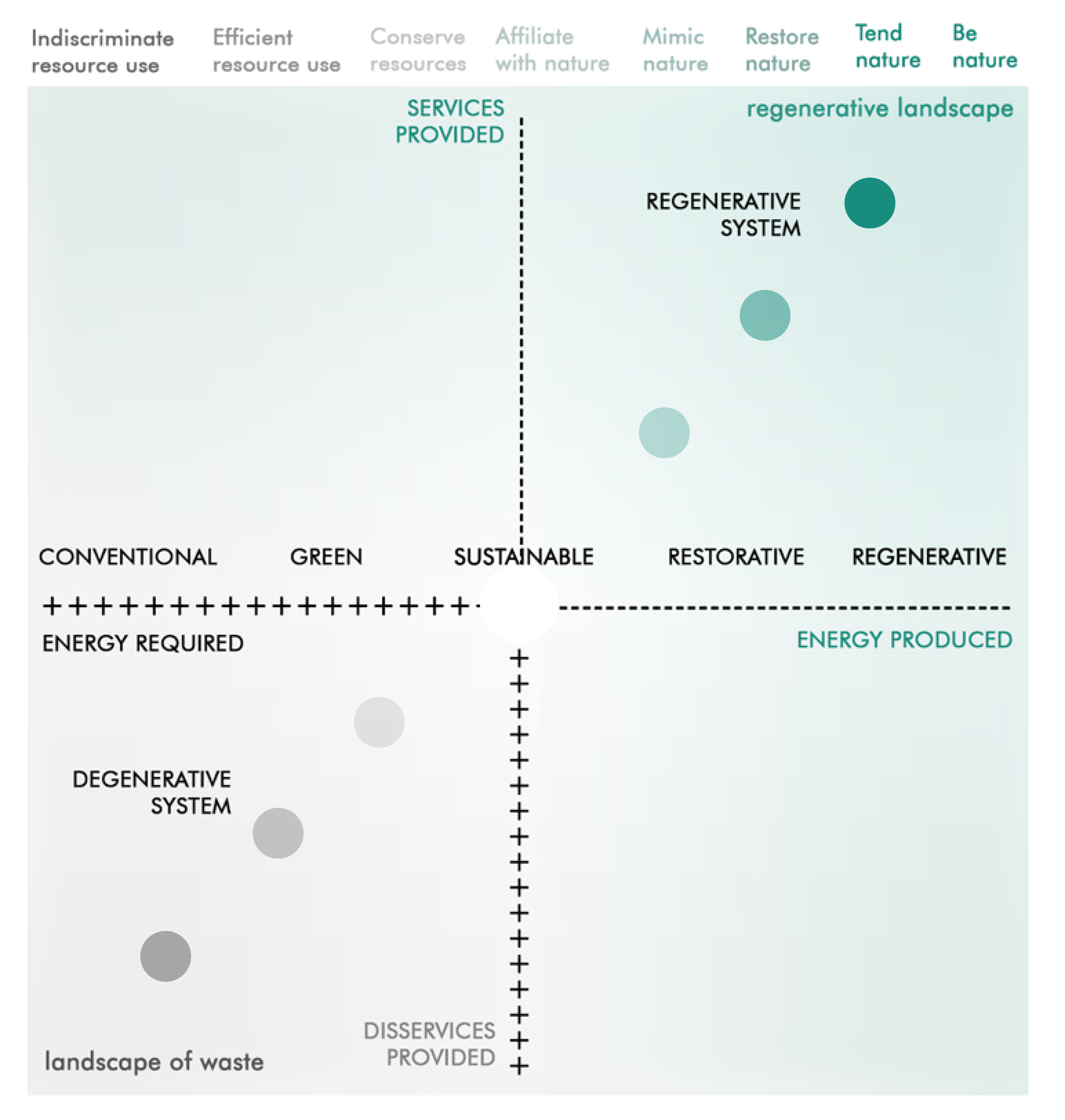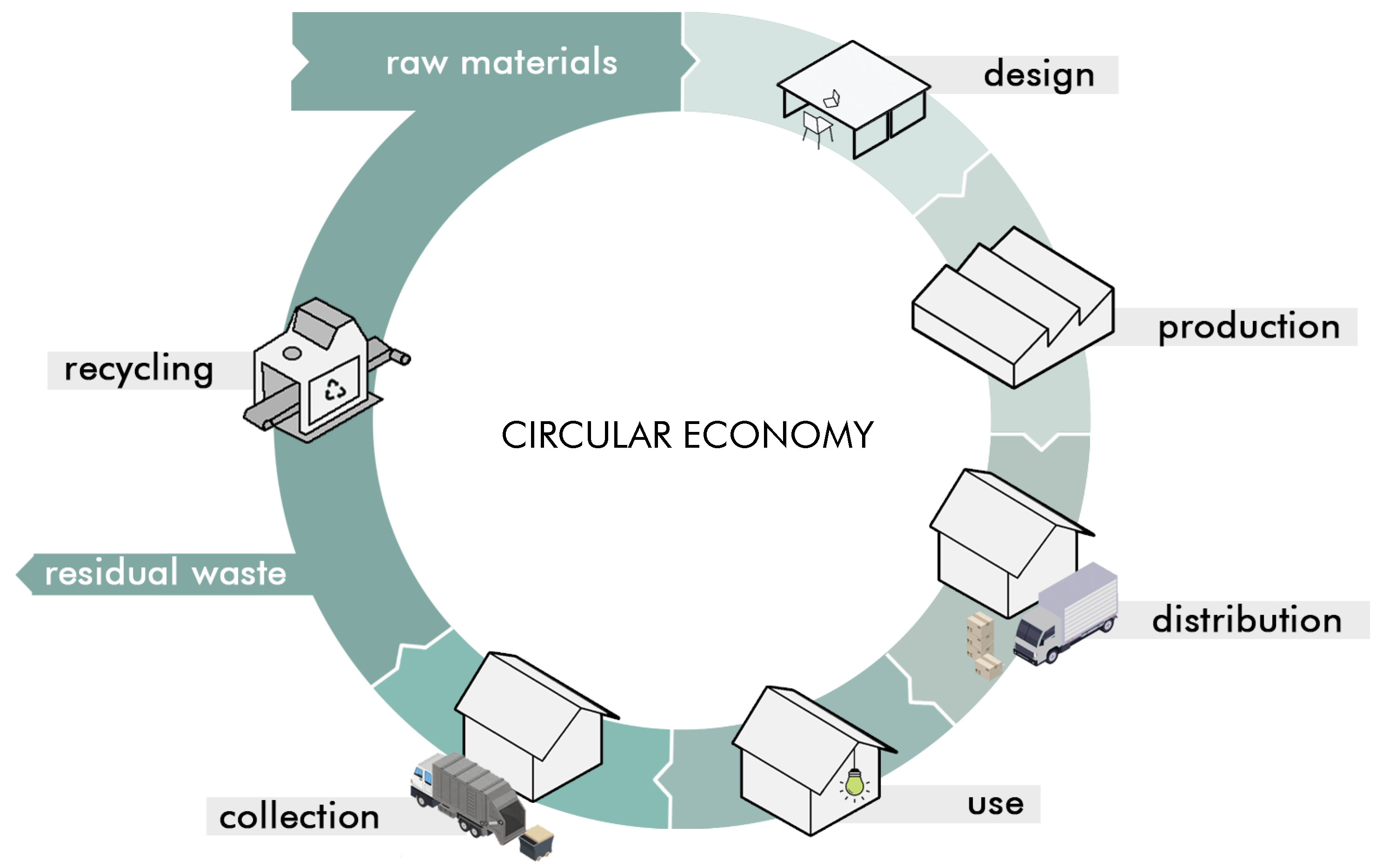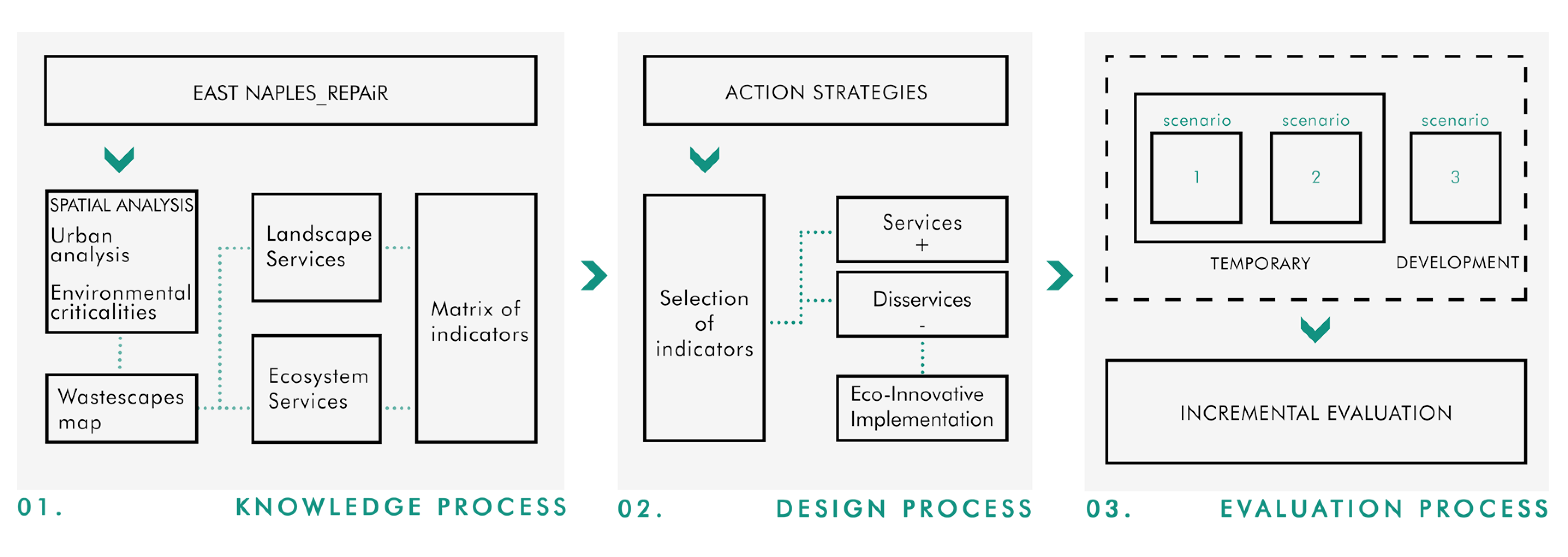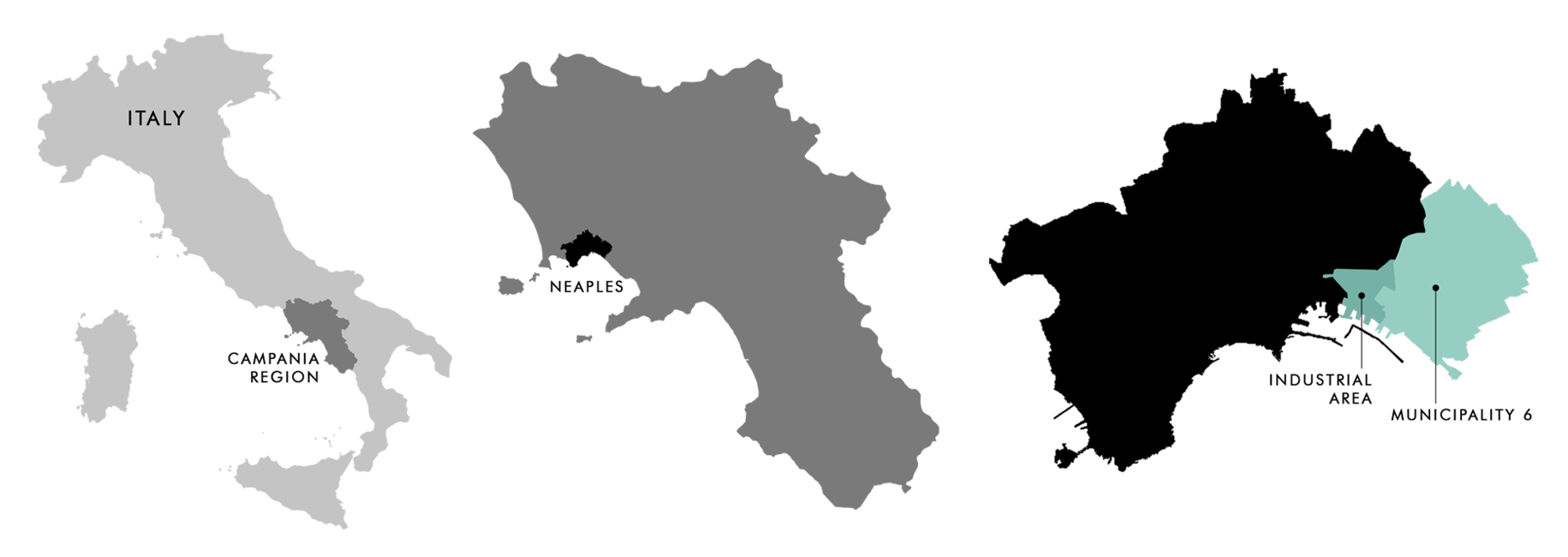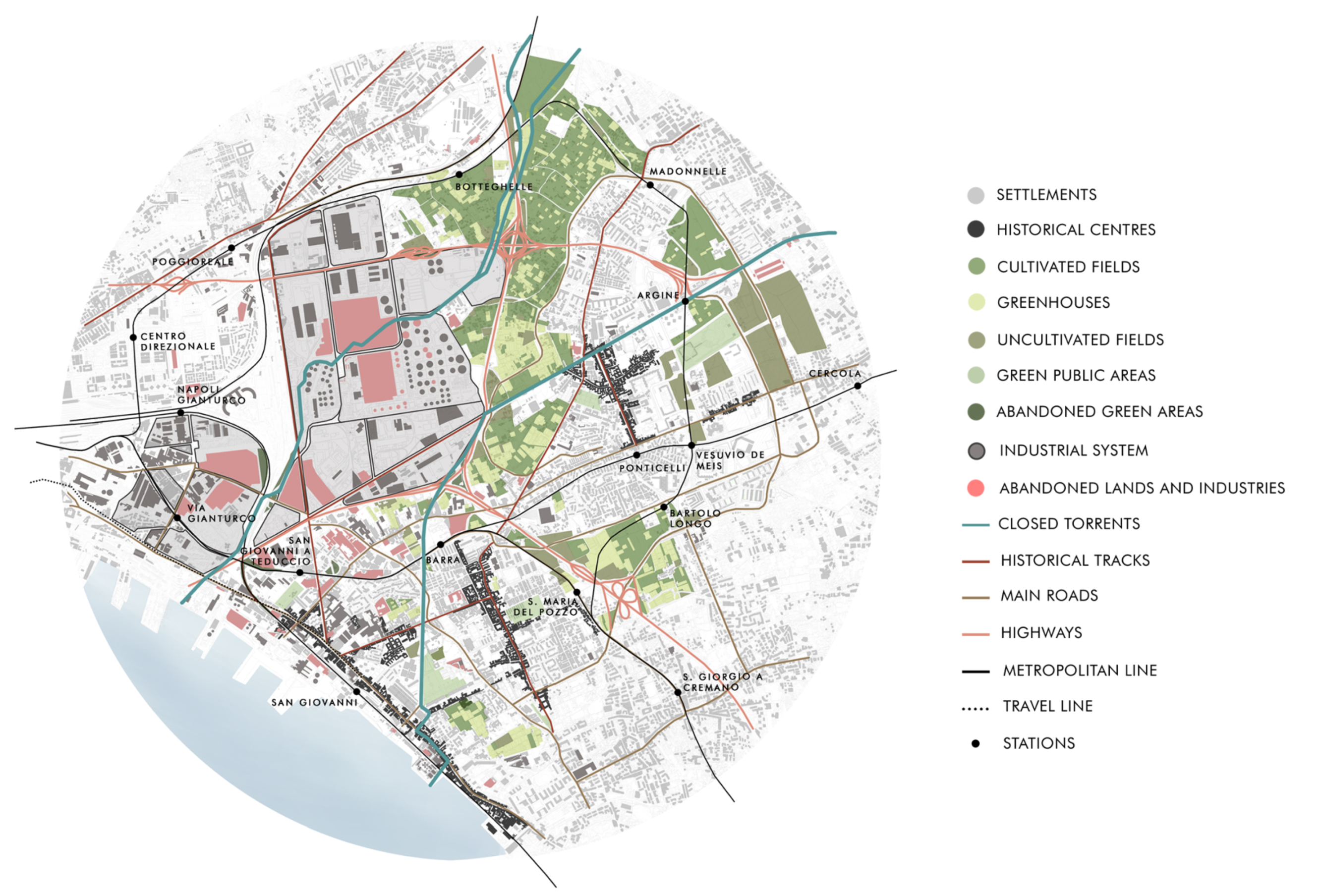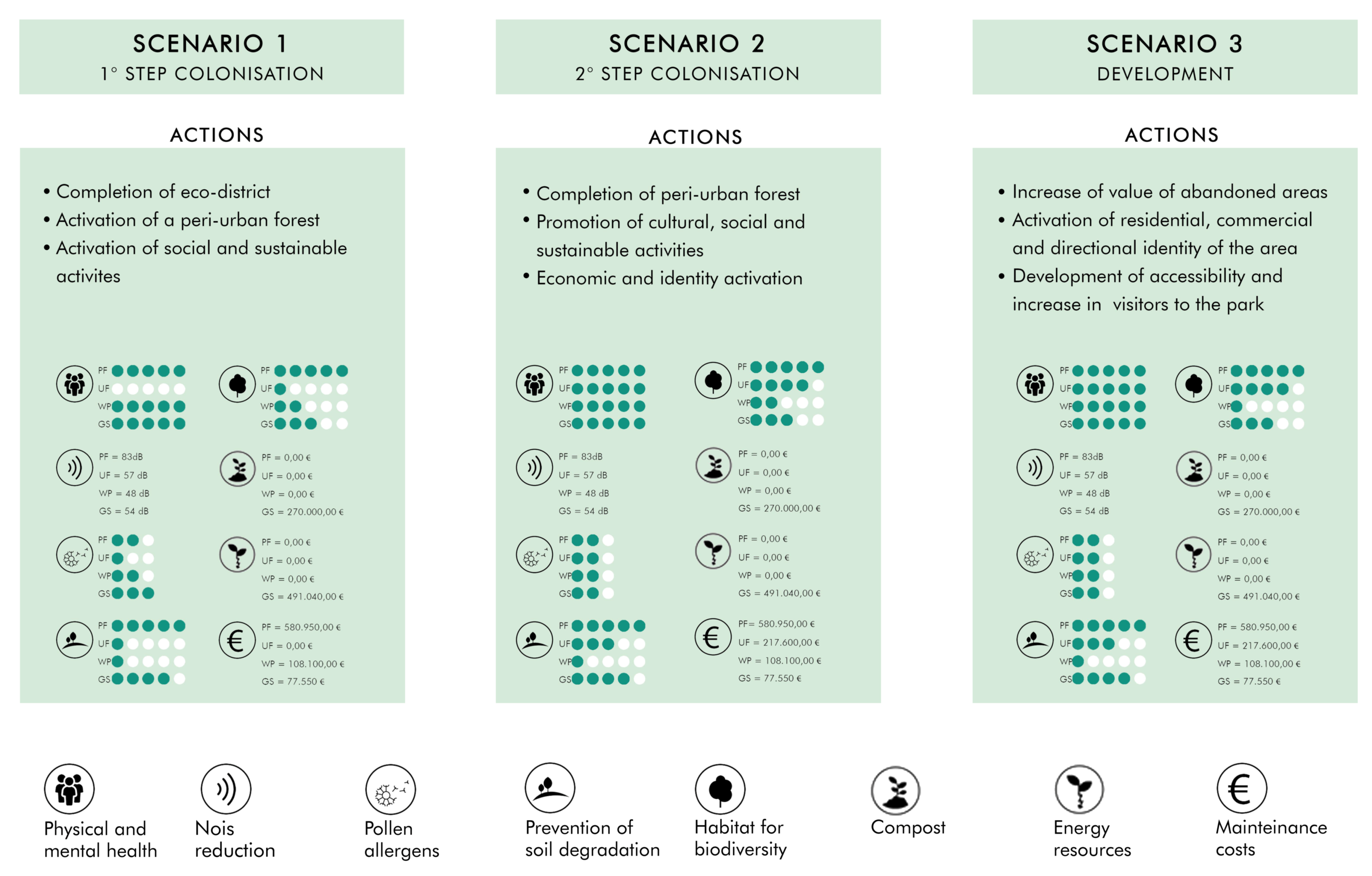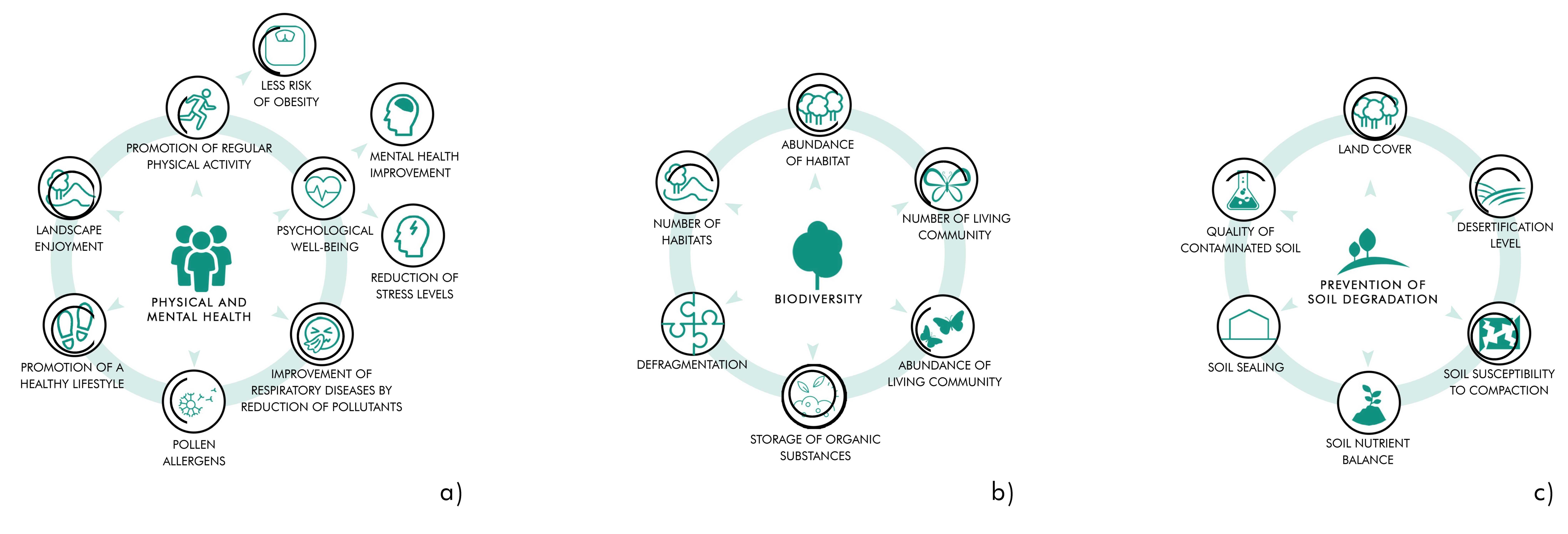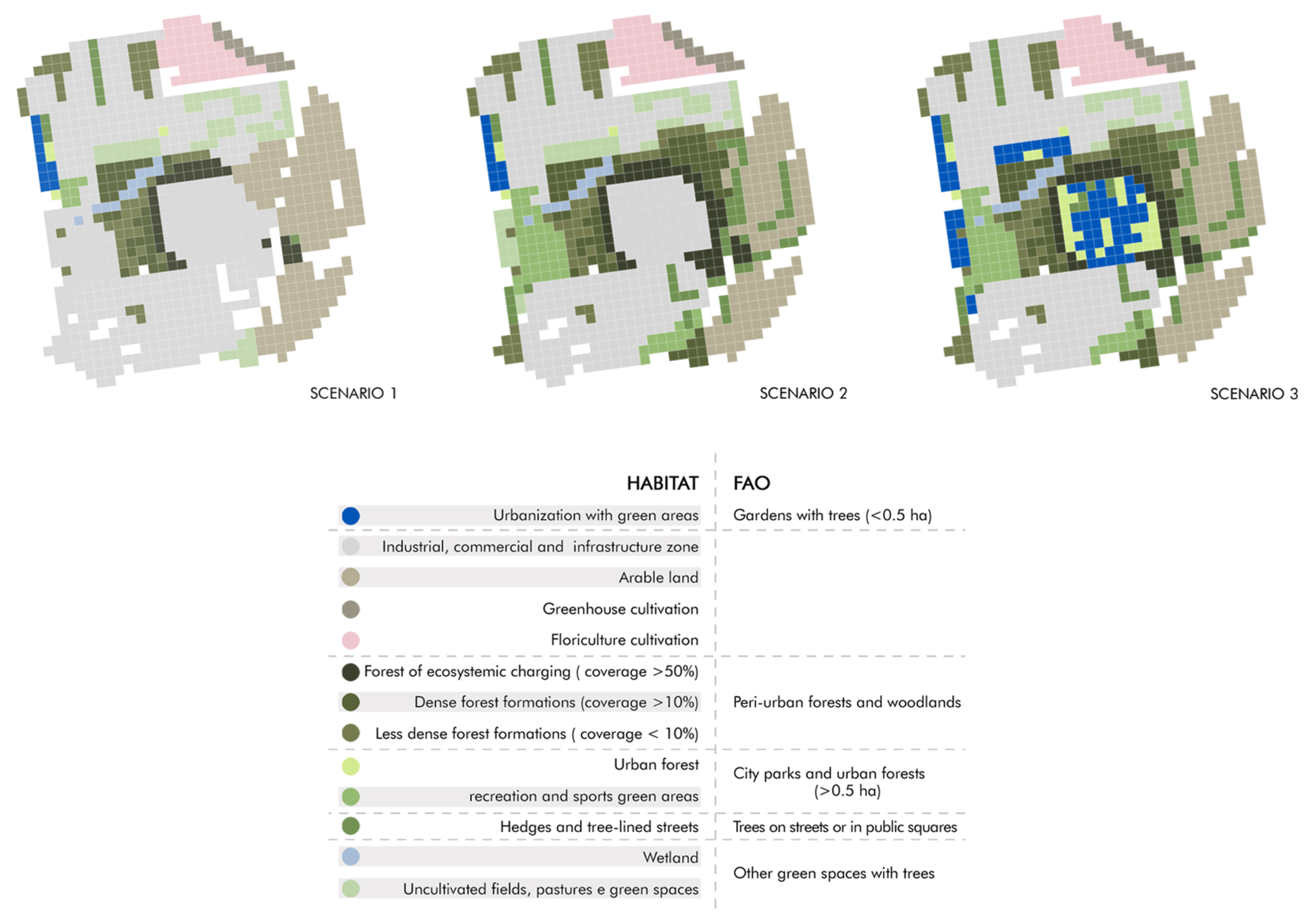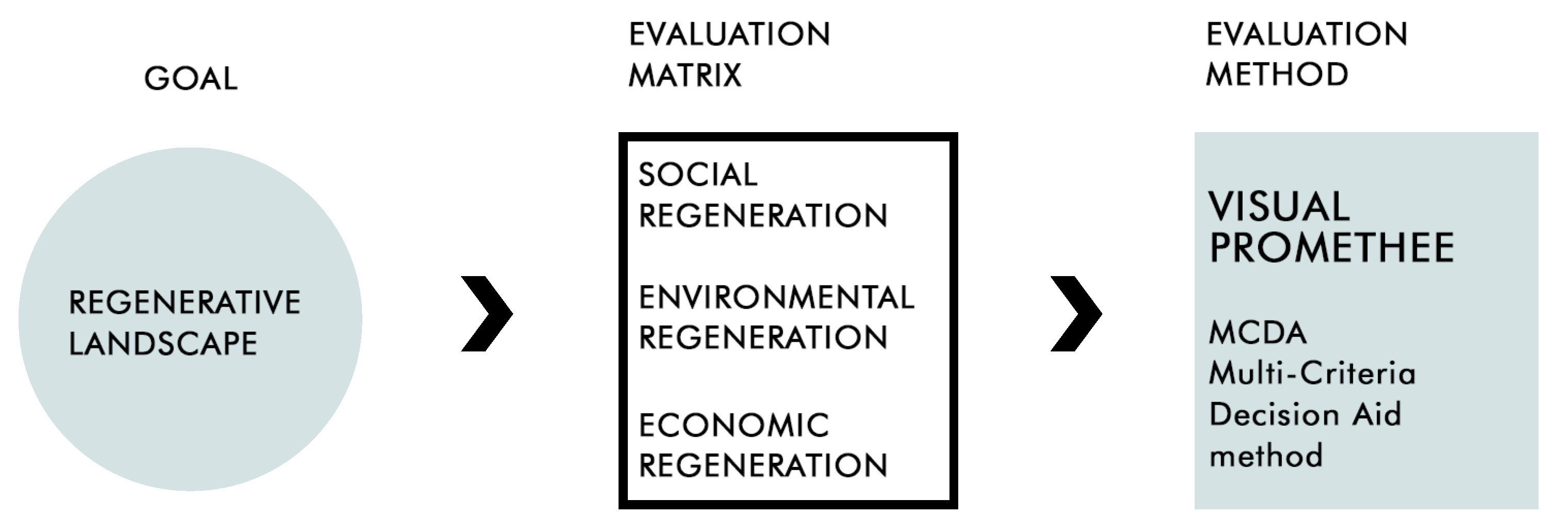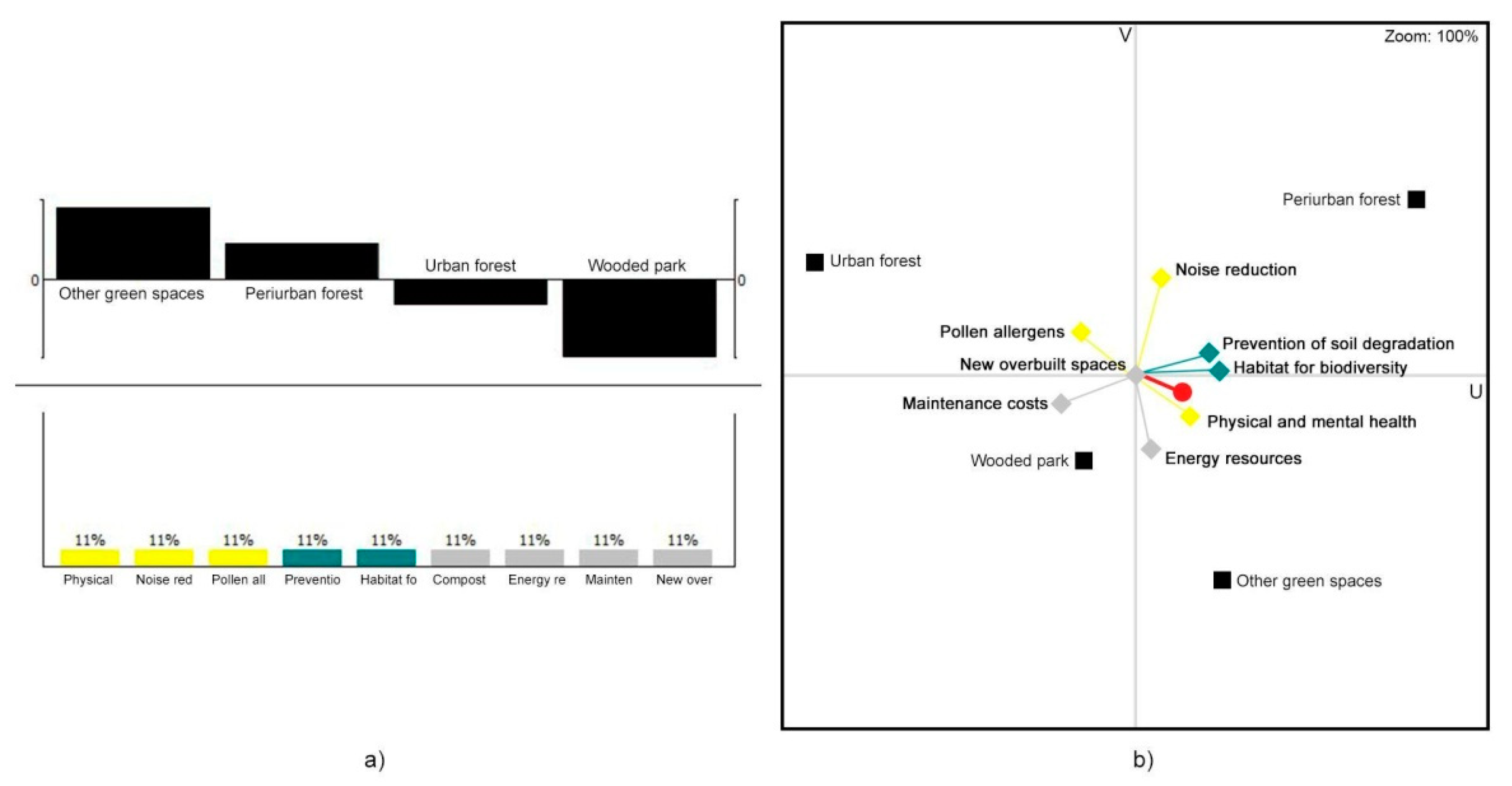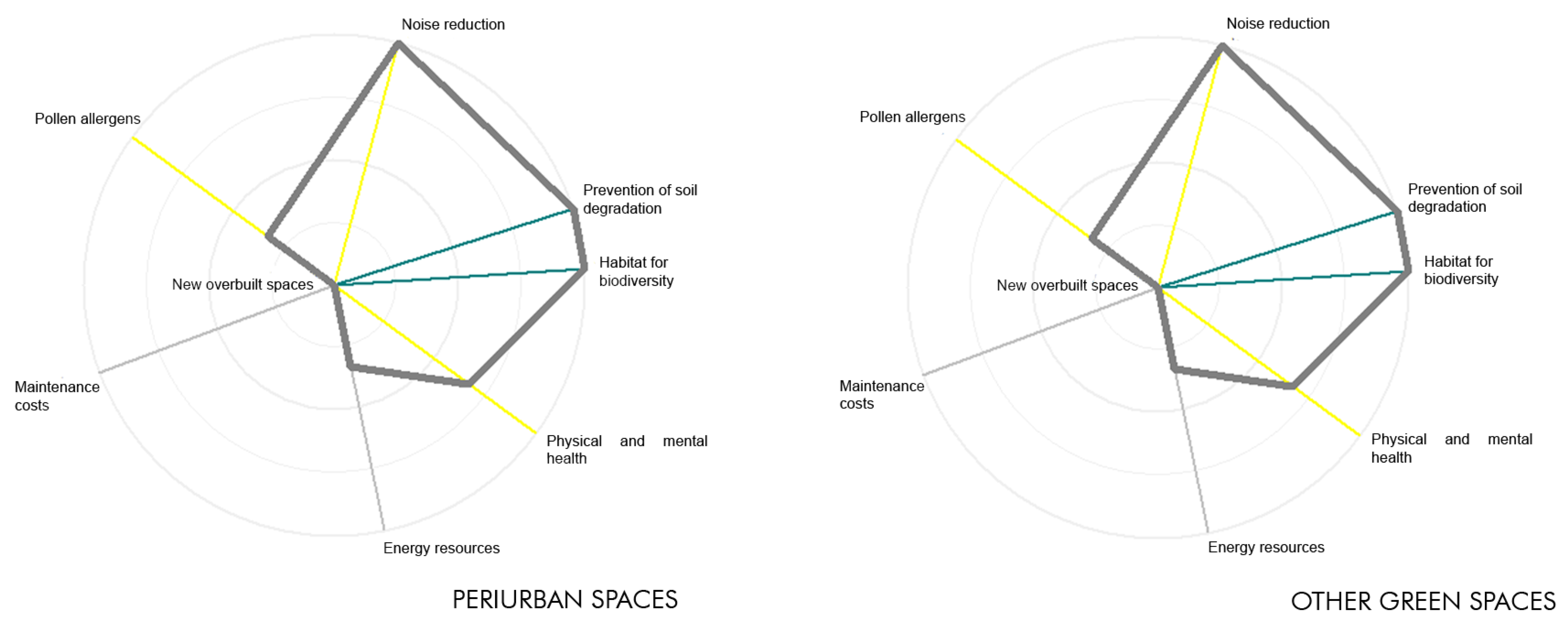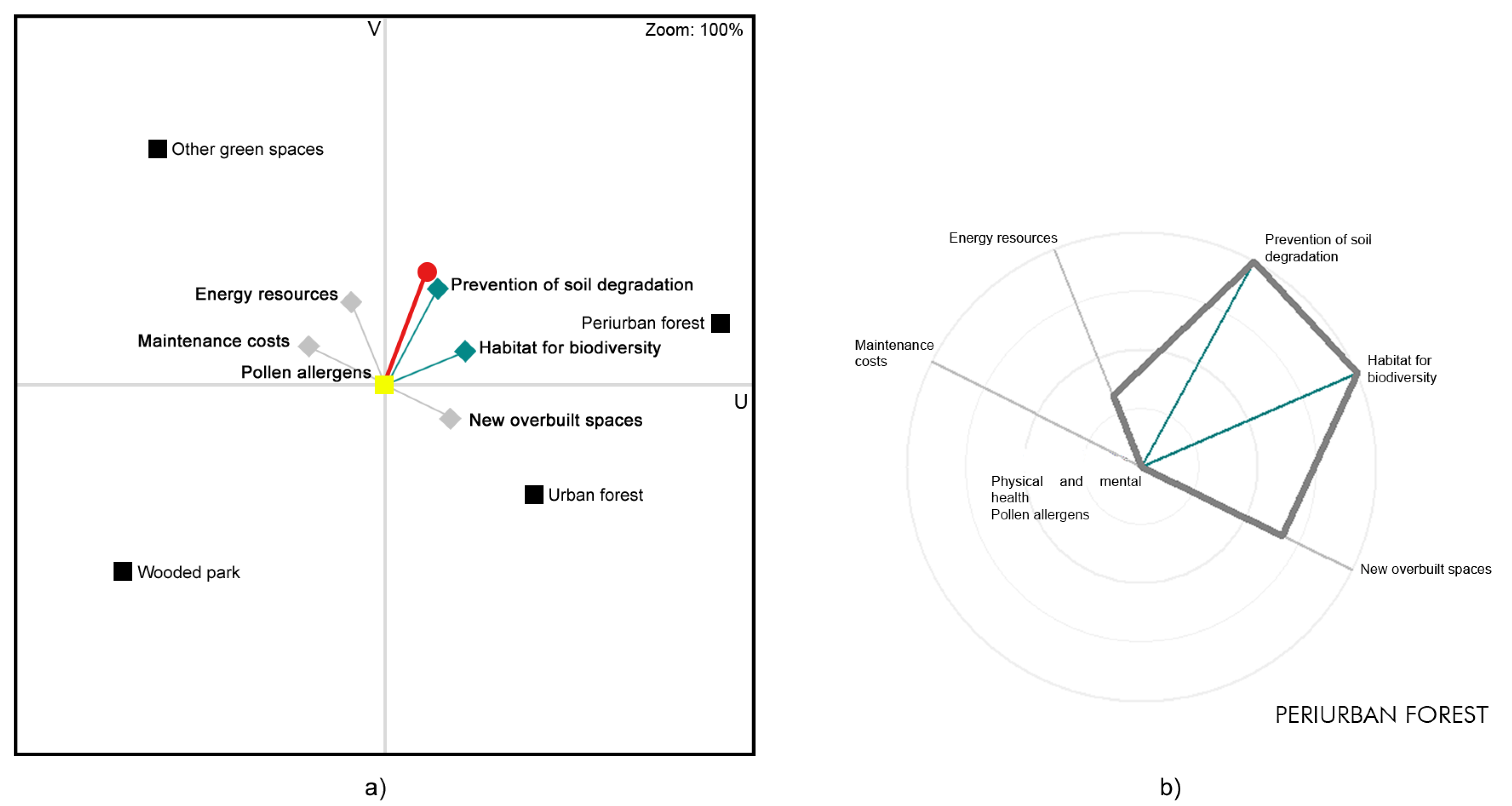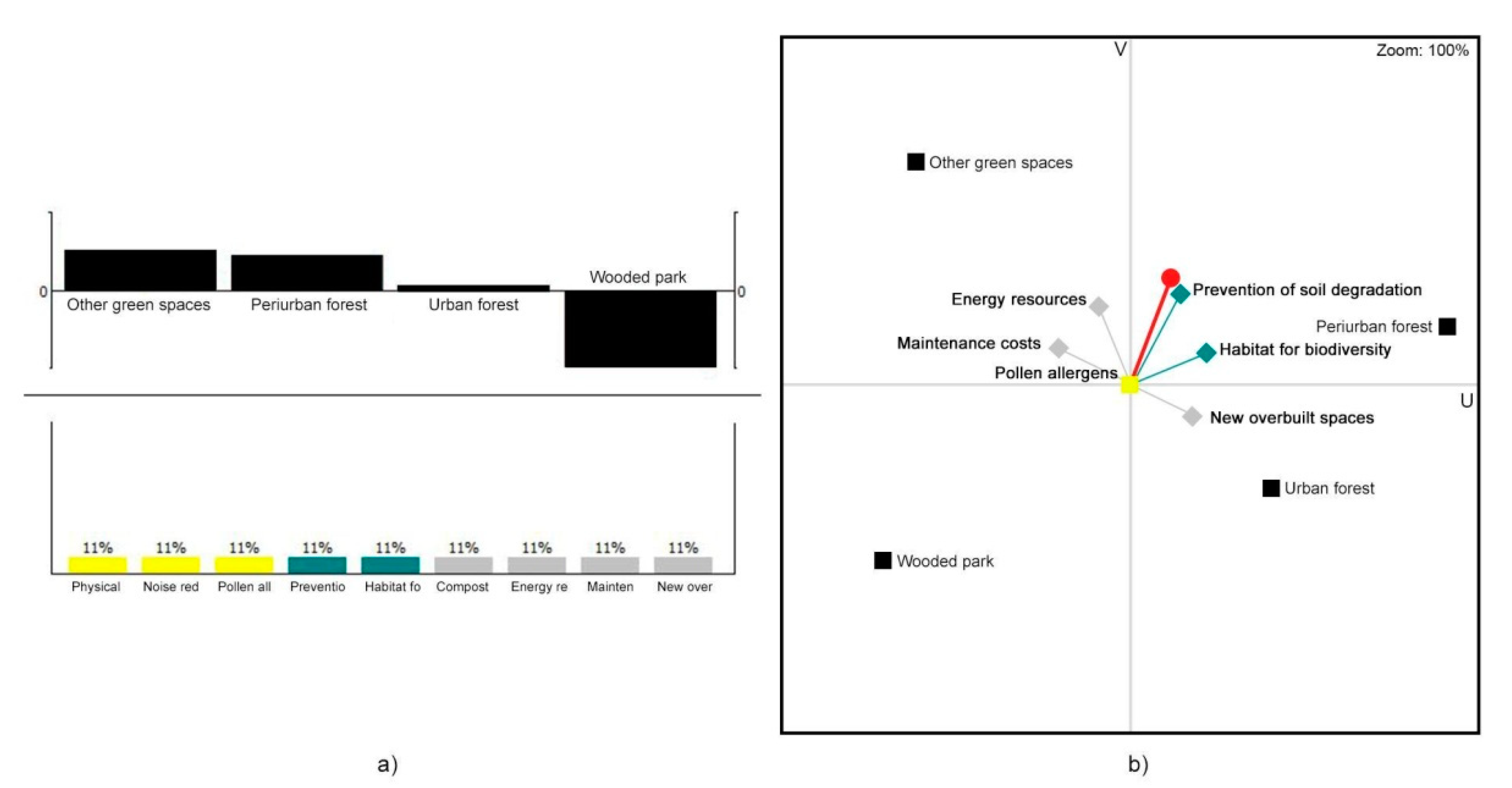1. Introduction
Two-thirds of the European Union (EU) population resides in urban areas, and they use around 80% of energy resources [
1], determining critical conditions for quality of life and increasing crisis complex environments. The widespread crisis in urban areas in recent decades has led to the definition of European plans and agendas to adopt common policies [
2] and to activate shared processes to support cities policies, where human settlements act as main catalysts for creativity and innovation across the EU. Anyhow, they are also places where various persistent environmental problems reach the most worrying levels, especially related to waste proliferation. Indeed, almost 70% of waste generated globally is currently not reused or recycled [
3], and cities contain both the cause and solution of most of today’s global challenges. These conditions need serious policies and programs, planned and managed with a multidisciplinary approach, where urbanisation can drive the change, turning problems into opportunities [
4].
The New Urban Agenda, adopted at the United Nations Conference on Housing and Sustainable Urban Development (Habitat III), aids as a shared vision for world urban areas for the next 20 years [
5]. It is a guide for building prosperous cities and centres of cultural and social well-being while protecting the environment. The Agenda also specifies guidance for achieving the Sustainable Development Goals and provides the underpinning for actions to address climate change. Priorities like air quality, housing, the inclusion of migrants and refugees, urban poverty, jobs and skills, circular economy, digital transition, urban mobility, climate adaptation, energy transition, public procurement, and sustainable land use partly concur in the Sustainable Developments Goals (SDG) 11, “Make cities inclusive, safe, resilient and sustainable”: sustainable cities and communities due to the complex configuration of the dynamics influence urban challenges.
In the above perspective, a multi-dimensional approach is required to analyse and operationalise scenarios able to trigger action strategies for regenerative processes and to reduce or eliminate degradation conditions, with specific attention to unresolved territories and expression of different kinds of crisis. Degradation is a product of waste, a phenomenon to be considered not only materially, but also as an immaterial effect of choices on those neglected parts of the built environment.
From this position, extending the view on the waste phenomenon in urban space, and looking at the landscape of waste, the concept of
wastescape [
6] has been explored in the Horizon2020 REPAiR project,
Resource Management in Peri-Urban Areas. Going beyond Urban Metabolism [
7]. The project aimed to explore methodologies and tools to integrate the management of urban metabolism waste resources with the strategic management of the peri-urban territories [
8], starting from the circular economy (CE) paradigm [
9,
10], and to elaborate eco-innovative solutions and strategies [
11] for resources management and wastescape regeneration.
The study started from a mapping of metabolic flows, together with the identification of the
wastescape. From the literature on American
drosscapes [
12], those parts of the unsolved territories that have been excluded from urban growth processes or abandoned as a result of new economic dynamics were classified. Three interconnected fields of analysis concur to the rise of spatial phenomena of waste: spatial, material flow, and socio-economic phenomena. Wastescapes have been defined as places in crisis according to their main spatial categories identified in peri-urban areas: Degraded lands; degraded water and connected areas; declining fields, settlements, and buildings in crisis; “dross” of facilities and infrastructure, the operational infrastructure of waste [
13].
The main character of cities and contemporary culture is represented by the
fragment, such a chaotic dispersion of things, subjects, practices, and economies [
14]. In this context, wastescapes are critical fragments of contemporary growth, excluded or disconnected from the rest of the urbanised areas, witnesses of the failure of economic processes for multiple causes. They can cause negative impacts, risks, and/or disamenities. Wastescapes are places of ongoing degenerative processes due to abandonment, pollution, and isolation that lead to ecosystem depletion, social risks, economic devaluation, and other environmental risks for human beings, flora, and fauna. Although waste was mostly considered as a problem to solve for decades, nowadays it is recognised as a new economic resource to be used [
15] in the CE paradigm for the built environment [
16].
In the REPAiR project, waste and wastescapes have been considered key elements to close the loop. Circular supply chains are the core of new urban scenarios in circular cities, to implement looping actions [
17]. Unsolved territories contain significant regenerative potential. Wastescapes adaptability is precisely in the emergency scenarios they configure because these
fringe areas [
18] are suitable for new shifting scenarios. Modifying a perfectly functional system requires multiple evaluations, and a strong reason to start a change.
From this point of view, multi-dimensional urban challenges can turn the tide elaborating alternatives starting from the most critical urban landscapes. This paper copes with the issue of a class of unsolved territories in the framework of
wastescapes, considering strategies to subvert the degenerative effects of abandonment places in urban and peri-urban areas into values and services for human well-being and the environment. The regeneration strategies proposed in the case study have been developed based on a methodology that starts with the identification of the Ecosystem and Landscape Services, defining an incremental evaluation process, oriented to regenerate wastescapes and, at the same time, to make landscapes able to activate new regeneration processes according to a continuous loop, in a process consistent with the principles of CE, called “regenerativescapes”. The following paragraphs introduce the theoretical background, to define an approach to answer the question: How to convert a
wastescape into a
regenerativescape?
Section 2 analyses the role of Urban Ecosystem Services and Disservices for wastescape regeneration, and explains the concept of regenerativescape.
Section 3 articulates the description of the methodological framework (
Section 3.1), the case study (
Section 3.2), the incremental evaluation framework, with identification of criteria and indicators for the assessment of a regenerative urban scenario (
Section 3.3), and project scenarios defined as an evolutive transformation process (
Section 3.4).
Section 4 describes the results and
Section 5 presents a discussion of the results and outlines possible conclusions, opening to the next steps of the ongoing research.
2. Regenerativescape: A Circular Approach for Wastescapes Regeneration
A wastescape is a part of the landscape that does not provide any kind of service, both natural and man-made. The condition of environmental degradation in urban settlements requires first the provision of ecological services. Through strategic planning, natural ecosystems in urbanised areas can generate value chains and socio-economic development opportunities. Environmental quality is the first and essential requirement in a liveable city. Urban ecosystem services (UES) play a key role in this challenge [
19]. They may not only be ecologically and socially beneficial but also economically advantageous [
20], to be appreciated in urban planning. Urban planning and policy are responsible for the equitable distribution of UES [
21].
Ecosystem health [
22] and human well-being are a
unicum, in particular in urban areas. A concept of fundamental importance affirmed and developed in the Millenium Ecosystem Assessment (MEA) is the link between the ecosystem services (ES) and the well-being of society. The basic concept is that in general, our well-being depends on the services provided by nature. According to the MEA, biodiversity in urban areas mainly performs air, water, and climate regulation services, becomes cultural heritage and supports cultural services. In peri-urban transition areas close to urban centres, cultivated areas provide provisioning, regulation, and cultural services. These services that nature offers when it is respected and cared for by human beings contribute to well-being by producing not only environmental but also economical and socio-cultural values. For instance, nature-based activities can be related to management and production in the agri-food chain, and the tourist and leisure activities for the inhabitants of the city [
23]. More generally, UES respond to many different human needs.
The fundamental human needs (FHN) have been outlined in Max-Neef’s matrix of needs and satisfiers [
24]. They are needs of subsistence, protection, affection, understanding, participation, leisure, creation, identity and freedom, and they are expressed in being (
qualities), having (
things), doing (
actions), and interacting (
setting). Needs and satisfiers vary through time and cultures, but fundamentals are constant in human-scale development approach [
25]. Human needs and subjective environmental well-being find common ground in the FHN and ES integrated approach [
26]. Habitat change, climate change and pollution are the leading direct drivers of change in biodiversity and ecosystems [
23].
ES are a comprehensive approach to landscape analysis, identifying functions and services to address regeneration [
25,
26]. Even though the number of studies concerning ES valuation has been growing, the practical application of evaluation has been criticised and its utility for policy guidance uncertain [
27]. According to some authors, beyond an idealised vision of the natural environment, in urbanised areas, it is also essential to take into account the Ecosystem Disservices (EDS) produced from natural elements [
28]. EDS are those negative impacts generated by nature to people. Von Döhren and Haase’s review on EDS literature with a focus on cities found that most of them are have been studied at a local scale [
29]. Significant indicators of EDS are about bio-physical, then economic and, last, cultural-social. Some of the urban EDS identified are: The allergenic potential of respective plants, extensively in areas of non-illuminated parks, a disservice to urban people, but fundamental for some nocturnal species; emissions of volatile organic compounds, emissions from maintenance activities, concentrations of particulate matter in the air, an abundance of undesired species, maintenance cost for urban green areas, percentage of tree species susceptible to damage, percentage of trees yielding fruits, number of aged trees, amount of affected infrastructure, number and size of trees near buildings, amount of water used for plant growth, etc. [
29]. Lyttymaki affirms that an essential issue of the concept of EDS is not about disparage nature in urban areas, but about putting both ES and EDS under a common evaluation framework [
30,
31]. Villa, however, argues that the use of the concept of EDS hinders, rather than helps, the development of an integrative and constructive dialogue on conservation and the complex interrelationships between human beings and nature [
32]. Equal consideration of services and disservices allows a holistic valuation that captures both positive and negative effects [
33], ever-present and object of multiple evaluations.
The definition and the scope of EDS is an open debate. Shackleton et al. [
34] in a review of literature about this definition say that disservices are EDS only if they are generated by the Ecosystem rather than human action. For instance, the dropping of litter has been used as an example of an EDS by Lyytimaki and Sipila [
35]. Still, the same might be said about aesthetically unpleasing man-made design on the landscape. According to Shackleton et al. [
34], human behaviours and values are not ecosystem functions and processes. Although we accept that humans are an integral component of ecosystems, humans themselves and their actions do not constitute ecosystems. In this open debate, the authors do not have a unique position considering ES and EDS of a wastescape. However, before further researches oriented to wastescape evaluation and regeneration, this study considers that both ES and EDS are generated by natural phenomena, put in the same framework to assess a planning strategy for the regeneration of a wastescape.
If we consider cities as living systems, and landscape as a cultural product, wastescapes can be defined as pathologies of urban systems, that need specific but holistic strategies to be healed. The benefit of ES and the impacts of EDS (meant as natural negative effects on human-beings) are components to evaluate for wastescapes regeneration. They can be pursued in an eco-complex approach to the landscape design. Multi-dimensional elements coexist in
ecoscape [
36]: Geographical landscape, living organisms, economic metabolism, social organisation, and cultural heritage, made of water, fire, soil, wood, living organism, minerals, and human beings.
In a landscape in crisis, UES and ES provide support to repair environmental dysfunctions and to activate services functions, that a site, a neighbourhood, or a city is lacking in [
36].
Over time, the study on ES has been accused of anthropocentrism, but man is a living being in nature like other species and like other species uses the resources available for his survival. ES make explicit the dependency relationships between human beings and the natural environment, and in this way, they help protect, manage, and design the natural environment [
37].
From this point of view, to investigate and evaluate regenerative development, ecosystem services (ES) and the landscape services (LS) head landscape analysis towards regeneration.
Regenerative design for the built environment has been a widely investigated field in the last decades. From Lyle’s first introduction of the concept of “design for regeneration” [
38], through the radical ecologist movements, humans are seen as an integral part of nature and partners in the processes of co-creation and co-evolution instead of being mere users of various ES [
39]. Integrating FHN, ES, and landscape functions, “capacity of an ecosystem to provide goods and services that satisfy human needs, directly or indirectly”, in planning [
40,
41] is a support to the decision-making for environmental regeneration.
The scenarios caused by climate emergency are indicators of the fact that today it is no longer enough to talk about sustainability. Projects on the natural and built environment cannot exclusively have zero impact but should provide goods and services not only for human beings but for the environment too [
42]. While current sustainability practices focus on providing no effects, the restorative design aims to re-establish ecosystems, and regenerative design aims at allowing human and natural ecosystems to develop. Regenerative Design [
43] is a forerunner concept of the CE. Nowadays, CE has positive effects on job creation and a green transition, strengthening social inclusion.
Environmental regeneration leads to an improvement in the living conditions of human and non-human beings. It is not possible to restore an ecosystem, but regenerating it is possible because it is a living system and not a static entity. In this framework, landscapes of waste need regenerative strategies to provide UES and low energy systems [
44,
45]. The goal in the design of regenerative landscapes,
regenerativescape, is to improve the status quo of landscapes of waste,
wastescapes, by restoring damaged services and enhancing them with new compatible ones (
Figure 1). As well as the natural landscape, a built environment can also go beyond the green building concept and practices [
46].
In the legacy of deep ecology perspective [
47,
48], the Regenerative Development investigates how humans can be partners in evolution with nature, going beyond the simple respect of nature. In the Regenerative Development manifesto, Regenesis Group states that the world is complex, and nature does not need our protection, but our collaboration [
49]. Because the best response is a local response, there are no standard strategies to copy, but principles to adopt. In this approach, everyone has a crucial role because of the core importance of community engagement in this new symbiotic approach to the environment: A systemic development approach for human well-being [
25].
From this perspective, wastescapes are required to be designed not only to limit impacts, but to subvert the scenario by producing positive goods and services. The criteria that a Regenerative Design approach can provide to each wastescape are different and due to site-specific characteristics. It is essential to recognise that the question has multiple levels. The first level is a design question about how activities can be designed to harmonise with and support local natural systems. Another level has to do with a community’s awareness and the members of the community can be awakened to that connection. To this purpose, some of the practices related to the CE paradigm move in the direction of the principles and objectives defined in the context of Regenerative Design. CE is an expression of a systemic approach to economic development designed to benefit businesses, society, and the environment.
In contrast to the ‘take-make-waste’ linear model, a CE is regenerative by design and aims to decouple growth from the consumption of finite resources gradually. CE is a restorative and regenerative economy by design, where economic activity builds and rebuilds overall system health, recognising the importance of the economy needing to work effectively at all scales (for big and small businesses, for organisations and individuals, globally and locally) and considering three principles: Design out waste and pollution; keep products and materials in use; and regenerate natural systems [
50,
51,
52]. The main goal of CE seems to be closing of the supply chains of the production processes in loop. Indeed, in the CE paradigm, waste can be considered a new resource for the built environment [
16]. Although the dominance of waste management issues, CE is not only about waste reuse or recycle.
The dominant economic models are based on a linear system of production, use, and disposal of goods. The linear extraction model leads on the one hand to the depletion of natural resources through extractive activities, with consequent environmental and social impacts, and on the other to the generation of large waste areas for waste management, with vast portions of territory destined for landfills or waste management and treatment plants. RESOLVE framework [
52] stands for regenerate (shift to renewables resource, restore ecosystems), share (share assets, prolong life cycle through maintenance and design for durability), optimise (increase performance/efficiency of the product, remove waste in production and supply chain), loop (remanufactured products or components), virtualise (dematerialise goods), and exchange (apply new technologies and choose services instead of a product). Closing the circles of the production systems [
53] through industrial ecology processes can lead to integrated and clean production cycles, as well as employment and socio-economic well-being (
Figure 2), as it replaces the areas of raw material extraction and material storage areas with new areas of production for all hinges to close circular processes. Human beings are the only terrestrial species that take from the soil large quantities of nutrients necessary for biological processes and rarely return them in a usable form [
54].
Even in small urban activities, combining a productive activity with one useful for the recovery or recycling of other waste can generate synergies and complex values with a positive environmental impact, as in the case of the production of compost in combination with the urban agriculture [
55]. Integrating waste stream management and wastescapes, the designing of circular urban metabolism is once again able to provide material and immaterial benefits for the well-being of human beings and the environment in which they operate.
The current generation shows the limited ability to use primary resources efficiently by still considering goods as disposable products, which, after use, become directly waste. Regenerative Supply Networks [
56] can be introduced as a connective element between the analyses of urban metabolism and the territorial dimension of Regenerative Design [
57,
58,
59].
The methodology adopted to deal with this approach has been the work on a set of criteria useful for the assessment of landscape, taking into account ES and EDS to drive a set of strategies for the urban regeneration of a wastescape in Naples, in the South of Italy. The implementation and optimisation of some composite indicators aim at driving the transition of wastescapes in regenerativescapes, in a progressive and systemic logic to host adaptive processes developed in incremental phases. A final multi-criteria evaluation of the three identified scenarios is presented as a decision support tool of the different design stages.
3. Materials and Methods
3.1. The Methodological Framework
This research aims to structure an integrated design methodology to the evaluation process for landscape regeneration, with particular attention to the environmental issue. Therefore, an incremental evaluation model has been built, where the different project actions are inserted in progressive and adaptive strategic scenarios supported by a value-based approach to the definition of each phase.
The research explores different approaches to Landscape Services, to define a valid methodology both for men (with whom ecosystem services traditionally compare) and for the environment itself. The definition of ad hoc indicators becomes a tool for knowledge and evaluation of landscape systems. They can simplify complex issues and make them understandable and usable even by non-experts, within the decision-making processes of planning and landscape management.
The study of environmental indicators and their graphic representation is one of the most effective tools for providing a concise description of the state of a given environment and its evolution and ensuring maximum accessibility, comprehensibility, and usability of the information. However, although this theory is widely addressed and analysed in the scientific literature, through the treatment of ES, nothing at a regulatory level makes the practice operational [
60]. The indicators of ES and EDS were mainly studied.
The proposed methodology is set out in three main phases (
Figure 3):
Knowledge process;
Design process;
Evaluation process.
The knowledge process represents the first phase of the methodology. This phase starts with the identification of the East Naples area, in the South of Italy, as a case study within the European Horizon 2020 project REPAiR. Urbanistic analyses, including qualitative and spatial elaborations, are carried out on the study area, the overlapping of which allows identifying the emergencies and potentials offered by the territory. These features are expressions of different values and are declined in terms of landscape services (LS) and ecosystem services (ES), on which the indicators matrix is built. The second phase consists of the process of developing project scenarios. In this phase, the strategic planning actions are defined and assessed according to the indicators of the relevant services and disservices that the study area returns, as positive and negative impacts.
Finally, the third phase coincides with the evaluation process, in which the three scenarios (the first two attributable to a temporary project and the third to a final project) proposed concerning the predominant actions are analysed, which are assessed in the function of the selected indicators. The evaluation is carried out using the preference ranking organisation method for enriched evaluation (PROMETHEE) method [
61,
62,
63,
64,
65], which represents a suitable tool for controlling the impacts that a scenario produces by increasing every individual action each time.
3.2. The Case Study
The case under examination is that of the four districts of Naples East: Ponticelli, Barra, San Giovanni a Teduccio (Municipality 6), and the Industrial Zone. This context is the flat area on the edge of the consolidated city, identifiable with the plain of the ancient marshes. In the evolution of the city, the configuration of the area has favoured the location of the first railway lines and the first industrial factories, leading it to its destiny as an industrial area and residential worker expansion [
66] (
Figure 4).
Today, the eastern area of Naples, with the overlapping of its multiple landscapes, occupies a large portion of the municipal area. This multiplicity constitutes a complex functional mix, the result of a city that is made up of parts linked to chance, dictated by different logics that contaminate, repel each other, fray along the edges; a city that grows involuntarily and uncontrollably.
From the industrial area of the city, the eastern region today presents itself as a cemetery of abandoned structures and boundless spaces left to abandonment and degradation, but at the same time large incubators of potential. It defines that typical assembled urban landscape where industrial and residential areas alternate, abandoned areas and agricultural areas with greenhouses, deposits, landfills (
Figure 5).
The case study is used as a basis for analysing the multidisciplinary and complexity that the design took on. If the planning approved in 2008 (preliminary of the Urban Planning Plan for area 13) was based on sustainability criteria, therefore reduction of pollutants, use of renewable energies, and promotion of clean industry, but still with a view to linear economy, today, after about 10 years, we are witnessing progress in the approach towards CE logics that aims at no waste and industrial symbiosis, as well as towards the regeneration of the landscape.
3.3. Evaluation Framework: Criteria and Indicators of a Regenerative Urban Scenario
Indicators, as tools for knowledge and evaluation of landscape systems, transform complex issues into data, making them understandable and usable even by non-experts. The definition of Regenerative Landscape considers three reference criteria:
Social regeneration, recognised by the community as a meeting place, support space for life and leisure, as well as a place of culture;
Environmental regeneration, defined by the ecosystem complexity; that is, by the complexity of the structure of an environment, measured as a diversity of habitats, productivity, species richness, of the biomass contained in the different trophic levels, and of the energy flows from which they are connected;
Economic regeneration, which defines the actions to intervene within a compact and complex context of the production areas.
The indicators selected for each cluster are oriented towards the specific case study knowledge and design. They represent an accurate summary of the reference literature to better respond to planning needs. Given the complexity of the case that includes different ecosystems within it, the table of indicators defines combined matrices where landscape, artificial, and waste ecosystems relate to each other. The ecosystem services were analysed taking into account the treatment of De Groot [
67], which focuses mainly on environmental aspects (production of oxygen, biomass, air quality regulation, carbon sequestration and storage, and others). An essential element of the case of Naples, however, is the relationship that ecosystems establish with human beings, with which new services are generated that De Groot does not take into account. For this reason, LS have integrated, which mainly analyses services related to social aspects (such as quality of place to work, mental and physical health, landscape enjoyment, and others).
It is also necessary to take into account those services which, however, bring negative aspects, that is, disservices, to human beings. These have been described as EDS and can relate to the economic aspect (such as costs due to the increase in maintenance of the green or to damage to structures and people), the social aspect (such as the discomfort produced by allergy to pollen or the presence of animals as carriers of diseases), and the environmental aspect (for example the discomfort caused by dark or poorly maintained green spaces or by the presence of animals inside public spaces), extended and in some cases re-adapted to meet the needs of the specific case better.
The indicators identified are grouped according to the social, environmental, and economic regeneration criteria to be pursued and, in turn, in the four classes of production, regulation, information, and habitat functions. This research summarises indicators related to Ecosystem and Landscape Services and Ecosystem Disservices, as shown in
Figure 6.
This cognitive reference framework has been taken as the basis of knowledge to define the criteria for the design of regenerative landscape scenarios.
3.4. Incremental Transformation Process: Project Scenarios
Starting from the identification of relevant elements, and from the recognition of positive results, an incremental transformation process has been carried out. The paradox of planning for
cities in evolution [
68] has been combatted by activating, in successive stages, the circular metabolism of the selected area starting from its regenerative components. The goal is to trigger multiple cycles of increasing intensity to create a new sustainable urban ecosystem over the long term. The transformation takes place through incremental and adaptive phases necessary to produce partial results that become the generative basis of the next phase. The proposed process is that of Cityforming, a design device intended by UniPa’s Creative City Lab, which is made operational in the case study, as a tool for reactivating urban metabolism and achieving the general objective of the project [
69].
The analysed industrial area is currently occupied by oil and gas deposits, namely 97.6 hectares of Kuwait Petroleum Italy to 12.6 hectares by Eni Agip; abandoned industrial settlements, that were former refineries; crumbling structures.
The design proposal takes place in a phase previous to the final disposal of the area, or in the phase of the creation of the fertile substrate where the new Ecosystem will develop. The goal is to contribute to the long-term process by generating new metabolisms. The design actions for the three incremental phases have, therefore, been defined.
The first two phases, which can be implemented in the short and medium-term, coincide with the transition scenario, which precedes the divestment. This scenario constitutes the driver that invests the power to transform a wastescape into a
regenerativescape: A landscape that, by enabling social and ecological systems, acts as a dispenser and catalyst for a positive change within the place where it is located [
70]. They provide for the environmental regeneration of areas that have already been abandoned for some time through integrated remediation systems perfected with bioremediation techniques. The area is reclaimed and acquires a new identity of a peri-urban park and forest of ecosystem recharge. This action contributes to the improvement of UES, like the air quality and pollution mitigation [
71] and LS, as aesthetics of the place and spiritual benefit to inhabitants of the district [
72]. It prepares the next step that provides for the economic and identity activation of the area with the enhancement of social, cultural and economic functions within the peri-urban forest.
The third phase involves the implementation of the final project in a long time. This scenario is one in which the highest number of variables come into play. Indeed, these will depend on their social, economic, and cultural success, i.e., on how many citizens, workers, or tourists will recognise it as a “place”. On the temporal distance that will elapse between the actions envisaged by the previous phases and the successful disposal of the oil plants, conditions can change. In this phase, we proceed with the reclamation of the new areas and activating residential, commercial, and managerial functions, in a regenerated urban system. The building will also follow the principles of regenerative design. It should be part of nature and the context providing open spaces for free aggregation.
5. Discussion and Conclusions
The regeneration strategies proposed for the East Naples wastescapes have been developed on the basis of a methodology elaborated considering the concept and the potentials of the Ecosystem and Landscape Services and Disservices integrated with the approach of Regenerative Design.
The methodology adopted explores the opportunity to drive a set of strategies for the urban regeneration of a wastescape identifying and implementing some criteria and indicators useful to describe the regeneration process considering social, environmental, and economic perspective, and to drive the transition from wastescapes to regenerativescapes, in a progressive and systemic logic to host adaptive processes developed in incremental phases.
The decision-making process structured for identifying and select a situated regeneration strategy for unresolved territories considers the relevance of multi-dimensional impacts of transformations and the opportunity to activate synergistic relationships among specific actions and scenarios, including an evolutive and dynamic process during the time.
The structuring of an incremental decision-making process, in which the evaluation assumes both the role of a decision support system and of a guide for the elaboration of the actions characterising the scenarios, allows activating an adaptive path, an integral part of the design process. At the same time, the evaluation becomes a negotiation tool to identify priorities and to build shared scenarios, not only a tool for assessing the impacts of scenarios. In this methodological context, the implementation of a multi-criteria evaluation allows to analyse and compare the three identified scenarios, to verify the impacts and to understand the opportunities of the possible regenerative actions and is considered as a decision support tool of the different design stages.
The initial question related to how it is possible to convert a wastescape into a regenerativescape underlines the need of approaches and tools suitable for identifying the complex values of the landscape, even if in critical conditions, and evaluating the interventions for the regeneration including different components and their mutual interplay.
The elaboration of the decision-making process, in its main phases (Knowledge, Design, and Evaluation), faced some critical aspects. One of the most relevant is related to the difficulty to specify some environmental data explicitly and to assess the possible impacts. To get around this problem, it was necessary to refer to values already defined in general by the FAO [
76].
The elaboration of a decision-making process in phases, in which the scenarios are configured according to an incremental approach, allows highlighting how the dimension of time is essential in the implementation of a regeneration path, which is structured in a flexible and adaptive way. It is possible to underline how a regenerative process can determine not only benefits from an environmental and social point of view, but also an economic point of view. Indeed, as seen previously, scenario 3 acts on the environmental and social aspects, and especially on the economic ones, defining a drastic increase in the real estate value, therefore the activation of a market with the related demand and offer (currently non-existent).
The analysis must be comparable to be valid. All the scenarios have the environmental aspect in common, selected also taking into consideration the panorama of research within which the case study has been inserted. It is, therefore, probable that the chosen indicators do not fully satisfy the efficiency of the last scenario. Compared to the latter, the evaluation, while not showing its full potential, aimed to demonstrate its priority.
The PROMETHEE-GAIA method [
77] has been selected over other multi-criteria analysis methods since it allows to define the preference of an alternative to the others, obtaining a ranking among these with a clear comparison of indicators, offering the opportunity to assign different weights the criteria, for the definition of a Sensitivity analysis, and allowing a constructive debate between the planners’ team and the decision-maker. The GAIA plane offers itself as a descriptive tool that supports the PROMETHEE method and provides a powerful graphical representation of the results, useful for understanding the conflicts between the criteria and for addressing the problem of the weights related to them. Furthermore, this method allows the decision-maker to overcome the problem of comparability of different data—qualitative and quantitative—without requiring any normalisation [
78].
This research defined both a theoretical framework and a methodology to wastescape regeneration. Starting from the research carried out within the REPAiR project, an approach and an evaluation framework have been elaborated for the regeneration of waste landscapes, appreciated as active drivers of environmental and socio-economic services for the peri-urban landscape. The regenerative and systemic design approaches are the basis for the evaluation and transformation of a wastescape, that source of negative impacts, into a regenerative landscape, a place designed with nature to provide multi-dimensional services. We defined this kind of landscape a regenerativescape, able to combine the opportunities of Regenerative Design and the potentials of a healthy landscape. The concept of regenerativescape allows outlining a multi-dimensional approach for the regeneration of peri-urban territories, in which urban metabolism becomes determinant for the identification of possible actions of intervention, for the structuring of the decision-making process and the construction of a model of transition, also transferable in other contexts. A regenerativescape is a landscape that activates processes of self-regeneration and, at the same time, can trigger regenerative processes in neighbouring territories, promoting positive value chains. To implement a regenerativescape approach, the ES and LS have been analysed concerning the satisfaction of basic human needs, and also considering the EDS in the evaluation framework. The methodology applied to the case study of the industrial area of East Naples has addressed the scenarios of the wastescape regeneration by proposing dynamic and adaptive strategies, designed for progressive actions to implement in the selected context. The criteria and indicators have been defined following the theoretical approach to the regeneration of wastescape, and constitute a site-specific proposal concerning urban dimension analysis of the case study area. The results, obtained by the PROMETHEE-GAIA method, provided a basis of knowledge and discussion for decision-makers and the stakeholders involved in the transformation of the area, and are adaptable and evaluable by modifying the elements of the project scenarios according to more specific purposes. The defined methodology, therefore, proposes itself as an adaptive and incremental framework for the progressive implementation of a regenerativescape strategy. In the next developments of the research, to give a more articulated answer to the question how to convert a wastescape into a regenerativescape, it is relevant to consider regeneration processes focused on social and cultural components, attentive to both the material and immaterial dimensions of the transition, consistent with an inclusive Regenerative Design approach, and able to make operative a human-scale development.
